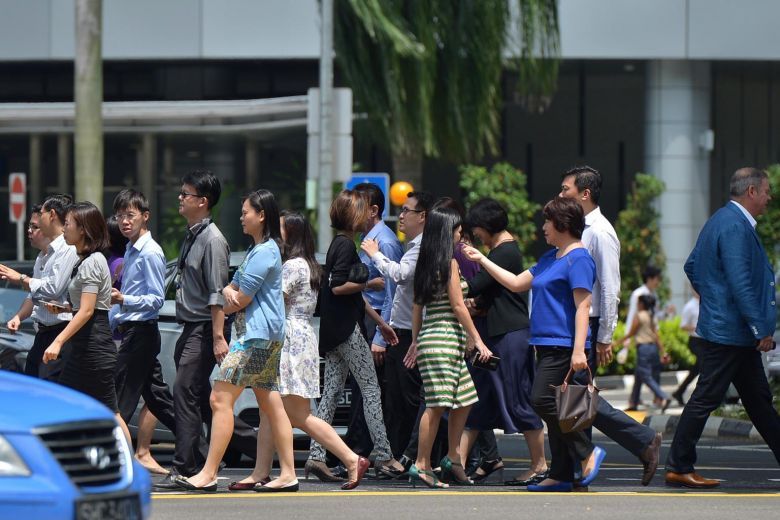New scheme offers funding and professional help for service companies to transform and boost productivity
Sign up now: Get ST's newsletters delivered to your inbox

The new Service Industry Transformation Programme aims to help businesses improve the way they serve customers, streamline and digitalise operations, and redesign jobs to attract workers.
PHOTO: ST FILE
Follow topic:
SINGAPORE - Service sector companies can now get more help to transform their businesses as they adapt to changing manpower needs and consumer demands.
They will be able to tap government subsidies and professional guidance under the new Service Industry Transformation Programme (SITP) announced by Manpower Minister Josephine Teo on Wednesday (Sept 11).
Companies can implement up to two transformation projects with the help of a certified productivity consultant from the Singapore Productivity Centre (SGPC) which, together with Workforce Singapore (WSG), aims to support close to 180 companies and 1,100 workers in the service industry over two years through the new scheme.
In her speech, Mrs Teo said amid present economic uncertainties, some employers are worried, and they might wonder whether it is better to think about survival and current jobs than about transformation and jobs of the future.
The simple answer is to do both, because Singapore is fundamentally labour-constrained and businesses need to become more manpower-lean over the medium and long term, she told some 200 business leaders at a service industry conference.
"If you hesitate because of short-term uncertainties... then the edge that you built up painstakingly could be lost," she said.
"We can take advantage of this time to put in new systems and processes to better manage costs in the longer term, to better our product and service offerings to capture market share."
"By doing so, we end up also redesigning jobs to make better use of our manpower resources and also improve job satisfaction for our workers."
In the light of this, the SITP aims to help businesses improve the way they serve customers, streamline and digitalise operations, and redesign jobs to attract workers.
Under the scheme, companies can send up to two representatives to attend a two-day workshop on techniques such as service design, job redesign and customer journey mapping.
A certified productivity consultant from SGPC will also conduct 6½ days of training and help companies identify areas for improvement and growth, and guide them through implementing projects over a four-month period.
Staff who participate in the programme will become certified "service transformation practitioners", who can then train their colleagues to identify other areas for transformation.
Small and medium-sized enterprises (SMEs) will need to pay $1,800 or $3,398 before tax, depending on whether they work on one or two projects. This is after a 90 per cent government subsidy.
Larger companies can receive a 70 per cent subsidy and will pay $4,794 or $10,194 before tax.
Companies interested to sign up can contact SGPC at joysen_chew@sgpc.sg
Six companies are already on board since the pilot launch of the scheme last month, said Mrs Teo, adding that the Government hopes more firms will take action to transform so that the service sector becomes much more competitive.
This will also help companies manage the upcoming reductions to the foreign worker quotas for the service sector, she said.
The sector's Dependency Ratio Ceiling (DRC), or the proportion of foreign workers a firm can employ, will be lowered from 40 per cent to 38 per cent on Jan 1 next year, and to 35 per cent on Jan 1, 2021.
WSG chief executive Tan Choon Shian said in a statement that redesigning jobs and remodelling businesses in the service industry should help SMEs overcome the manpower crunch.
SGPC chief executive Michael Tan also said: "As Singapore's economy shifts increasingly towards being services-centric, it is imperative that services enterprises accelerate their transformation to be lean, innovative and future-ready."
The SITP was launched at the inaugural Service Industry Transformation Conference, the first sector-specific outreach event to encourage companies to use Lean Enterprise Development Scheme (LEDS) programmes to become more manpower-lean and rely less on foreign workers.
As of June this year, more than 10,000 service sector firms have tapped the LEDS, said Mrs Teo.
During the event at Grand Hyatt Singapore, which was organised by SGPC and WSG with support from Enterprise Singapore, 10 trade associations and chambers representing more than 2,300 companies like travel agencies, retailers and hotels, pledged to drive transformation in the service industry.
The Association of Catering Professionals Singapore, for instance, will host a learning event for such groups to exchange best practices in the first quarter of next year.
One of the firms keen to join the SITP is vegetarian eatery chain Greendot, which has 130 staff across 12 outlets and two Chinese restaurants.
Co-founder and chief executive Fu Yong Hong, 30, said the company has made changes to its operating model - such as streamlining processes and introducing an electronic ordering system -since starting as a small stall in 2011. But he hopes to benefit from having someone external offer a fresh perspective on how to improve.
He wants to work on better training older workers, who make up about half his workforce, to go beyond serving and clearing food to be service ambassadors who can explain healthy eating and the company's vision to customers.
"We can slowly shift their role to allow them to have more ownership and take pride in their work," he said.
He also aims to create a stronger customer experience at his outlets.
"I don't want people to just eat and go, I hope we can positively impact them to change their lifestyle and eat healthier," he said.

